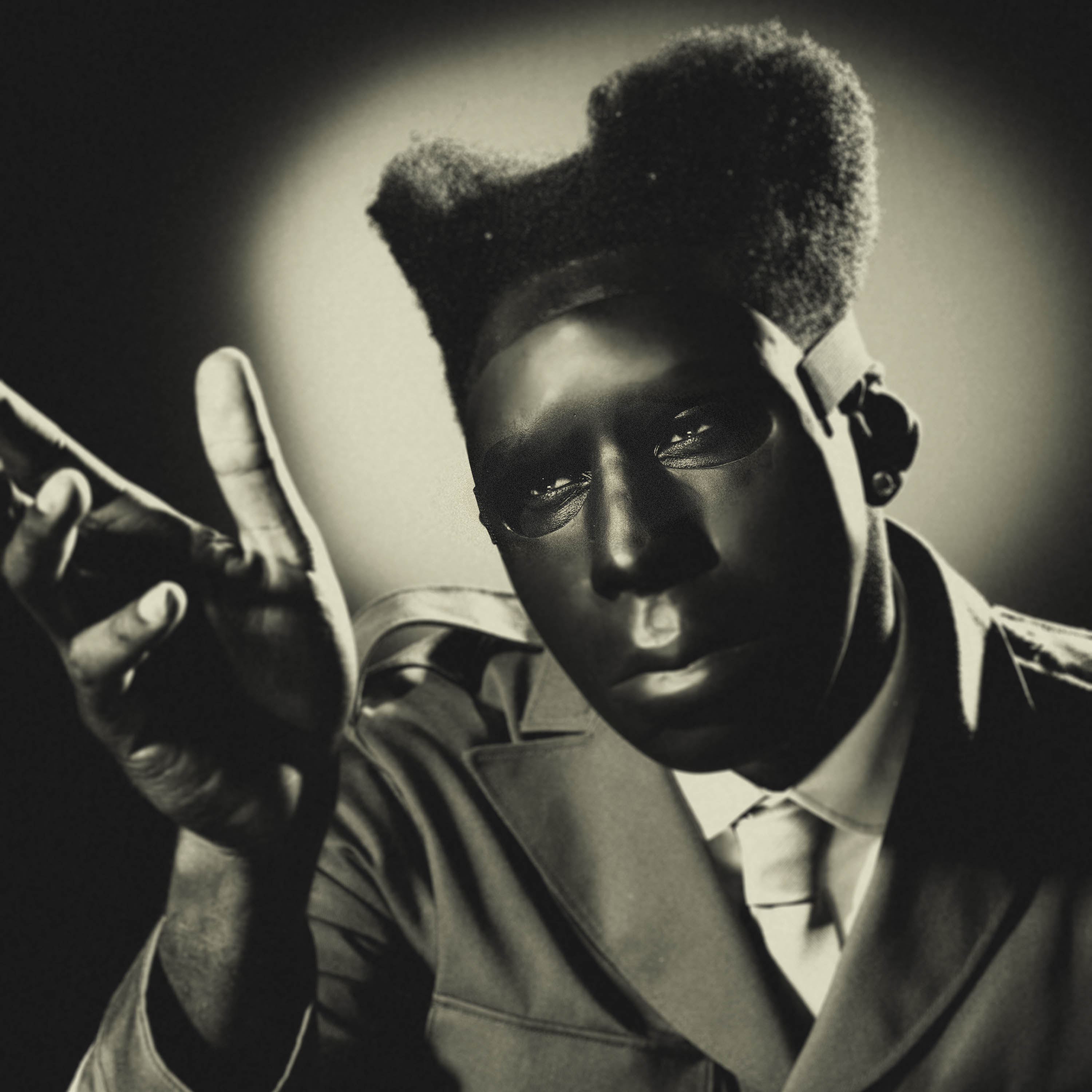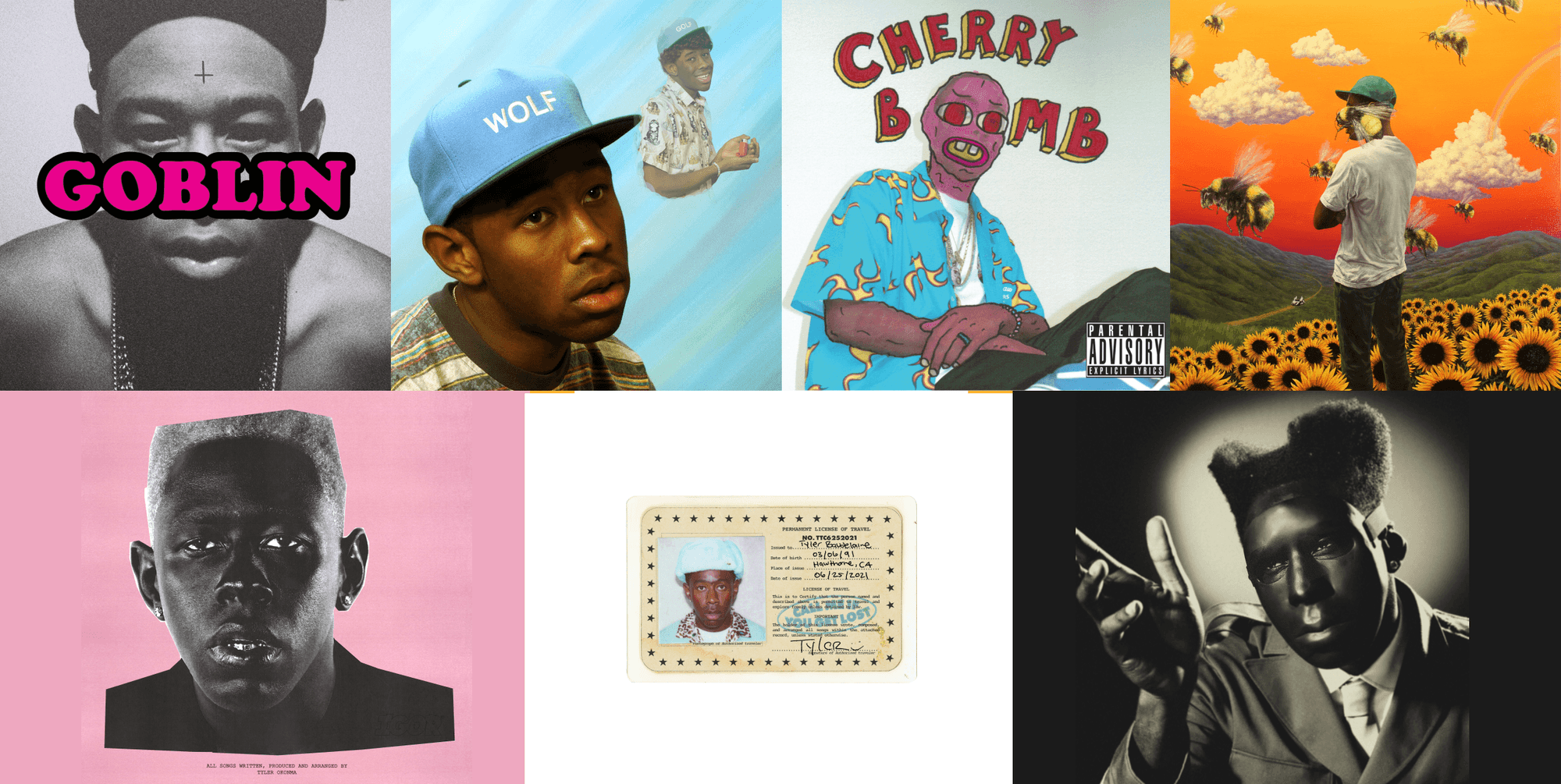Winner Takes All: Examining Tyler, The Creator’s genre-blending discography for his greatest album
A collage of Tyler, The Creator’s seven studio album covers shows the rapper’s discography from 2011 to 2024. In the top row are his albums “Goblin,” “Wolf,” “Cherry Bomb” and “Flower Boy,” and in the bottom row are his LPs “IGOR,” “CALL ME IF YOU GET LOST” and “CHROMAKOPIA.” (“Goblin” photo courtesy of Tyler, The Creator under exclusive license to XL Recordings Ltd. “Wolf” and “Cherry Bomb” photos courtesy of Odd Future LLC. “Flower Boy,” “IGOR,” “CALL ME IF YOU GET LOST” and “CHROMAKOPIA” photos courtesy of Columbia Records, a Division of Sony Music Entertainment. Design by Lindsey Murto/Design director)
This post was last updated Nov. 14 at 9:50 p.m.
Editor’s note: This article contains mentions of violence that may be disturbing to some readers.
It has been more than two weeks since Tyler, The Creator released his seventh studio album, “CHROMAKOPIA,” but the dynamic artist has been releasing unforgettable music for more than a decade. Ahead of this weekend’s Camp Flog Gnaw festival – which the rapper organizes – the Daily Bruin revisits Tyler, The Creator’s growing discography to find his best album so far.

“Wolf”
On “Wolf,” Tyler, The Creator revealed himself as a sheep in wolf’s clothing.
The rapper was once rumored to have eaten a cockroach. His lyrics matched his degenerate persona, writing of school shooters and killing women, if not worse. He’s not quite over this immaturity in 2013’s “Wolf.” He opens the album with profanity and uses the f-slur more than any of his other studio albums. Even when he is vulnerable, he is angsty. On “Answer,” he oscillates between begging his absent father to answer the phone and telling him to perform fellatio.
In that dichotomy lies the album’s beauty and modern value. Tyler, The Creator has become known for vulnerability – yet nothing feels quite as sincere and true as his second studio album. “IFHY” explores intense feelings of unrequited love behind a smorgasbord of instrumentation, while “Colossus” expresses deep discomfort with fan interactions over twinkling chimes and piano keys. The album effortlessly flows between these highlights and countless other ideas, with Tyler, The Creator’s immense orchestral talents shining through consistently. Even behind a persona, “Wolf” is always raw and honest.
By capturing Tyler, The Creator amid his sonic and lyrical transformation, “Wolf” becomes something different – and perhaps even greater – than the work that came before and after.
– Martin Sevcik
[Related: Album review: Tyler, The Creator’s ‘CHROMAKOPIA’ solidifies legacy, cultural impact]

“CHROMAKOPIA”
On “CHROMAKOPIA,” Tyler, The Creator finds his way home.
The rapper’s October release is his most intimate, stemming from his experiences growing up in Inglewood, California and blossoming around lessons his mother taught him. A hip-hop album that integrates quintessential elements of Tyler, The Creator’s best work – genre-bending neo-soul experimentation – “CHROMAKOPIA” has already transcended expectations.
Tyler, The Creator’s seventh album features self-important lyrics perfectly balanced by confessions of fears and failures. “Rah Tah Tah” sees him “stepping on the gas,” referencing his ascension to fame, but he hits the brakes on “Noid,” sharing his anxieties about the adverse effects of his success. Similar binaries are present throughout the 14-track album, accentuated by expertly placed piano melodies, horns, minimalistic beats and distorted instrumentals. Using these elements, Tyler, The Creator explores the juxtaposition between his self-confidence on “Thought I Was Dead” and his insecurities about his father and the similarities they may share on “Like Him.” These introspective elements are another reason why “CHROMAKOPIA” is a profoundly unique album from an artist known for putting on personas.
Tyler, The Creator’s mother told him not to dim his light – and it only shines brighter on “CHROMAKOPIA.”
– Mia Tavares

“Flower Boy”
With “Flower Boy,” Tyler, The Creator successfully contrasts positive instrumentals with the pain of loneliness.
Released in 2017, the hip-hop, neo-soul and jazz-rap album showcases a more mature side of Tyler, The Creator’s music. The track “911 / Mr. Lonely” most directly captures the overall theme of isolation due to its discussion of fame and sexuality as Tyler, The Creator expresses feeling lost as an adult. “Garden Shed” also acts as a metaphor for not hiding his sexuality with a hopeful message about his own growth.
Likewise, the arrangement of vocals from many high-profile features such as Steve Lacy, Frank Ocean, A$AP Rocky and Rex Orange County add dimension and perspective to each song. Clever vocal phrases like Ocean’s “chirp chirp” on “911 / Mr. Lonely” or the wordplay between Kali Uchis and Tyler, The Creator on the outro of “See You Again” create signature, iconic tunes. The accompaniment of drums, electric effects and jazz elements constitute sophisticated, textured rhythms. Tyler, The Creator’s production is impeccable and immerses listeners in a world of warm sunflowers with its sweet voices and meditative raps.
Upon a listen, “Flower Boy” will make audiences want to remain in its hazy soundscape forever.
– Angelina Alkhouri
[Related: Album review: “CALL ME IF YOU GET LOST” explores chaos of introspection]

“CALL ME IF YOU GET LOST”
For listeners looking for Tyler, The Creator at his most enthusiastic, there is no album better than “CALL ME IF YOU GET LOST.”
The 2021 LP was Tyler, The Creator’s second project to win Best Rap Album at the Grammys and to reach the top of the Billboard 200, but this degree of success and self-assurance was already evident in the album’s lyrics upon its release. “CALL ME IF YOU GET LOST” features some of the most buoyant music of Tyler, The Creator’s career, with the triumphant horns on the Teezo Touchdown collaboration “RUNITUP” or the percussive bass on “JUGGERNAUT” – which features boastful verses from Lil Uzi Vert and Pharrell Williams – exemplifying the LP’s jubilation.
But the album’s longest track is its crown achievement, as the nearly 10-minute “SWEET / I THOUGHT YOU WANTED TO DANCE” invokes funk, reggae and R&B to create a convincingly wistful but epically amorous jam. Supported by the lilting voices of Brent Faiyaz and Fana Hues, Tyler, The Creator delivers passion-filled lines like, “So what makes you think / I’m not in love?” The result is a grandiose tale of a relationship set over lavish genre-blending production.
With its emphasis on optimism and opulence, “CALL ME IF YOU GET LOST” provides an enjoyable experience for any listener.
– Reid Sperisen

“IGOR”
Writers’ consensus
Tyler, The Creator knows “WHAT’S GOOD.” And what’s good, nay great, is “IGOR.”
A full-fledged concept album, the 2019 masterpiece “IGOR” follows a love triangle in an ambitious, romantic, heartbreaking and ear-wormy way. “IGOR’S THEME” sets up the two halves of the album, falling in – then out – of love. The lyrics “ridin’ ‘round town, they gon’ feel this one” and “got my eyes open,” succinctly capture the album’s main thread. Static accompanies the simple beats laid on “IGOR’S THEME” to make a perfect thematic match to the vulnerability of a new relationship, exemplifying how the production on “IGOR” is intelligently raw.
Tyler, The Creator expertly shakes up traditional hip-hop elements with “EARFQUAKE,” in which he tenderly opens up about insecurities surrounding the infatuation stage of a budding relationship. But in “I THINK,” as the lyrics expose deeper feelings, the raw production emerges again, beautifully encapsulating the vulnerability of admitting romantic attraction. What makes “IGOR” unsurpassable is the introspective journey it takes lyrically through a relationship.
Tyler, The Creator’s lyricism is at its peak in “A BOY IS A GUN*.” The song marks a turning point in the relationship and album. The poignant metaphor of his partner as a gun seamlessly captures not only the comfort a partner may provide but also the toxicity they may create. Later, the charismatic “GONE, GONE / THANK YOU” articulates the acceptance and rationalization so desperately craved at the close of a relationship. The love is gone, and the lyrics thank the fictional partner in a brutally beautiful and real way. Moreover, the delicate chimes and whining guitar on “ARE WE STILL FRIENDS?” expose the intimacy and connections present even after the end of a relationship. This relatability and ingenuity throughout the album – both in lyrics and the tastefully disordered production – are why “IGOR” remains Tyler, The Creator’s best.
Ultimately, “IGOR” is an album impossible to fall out of love with.
